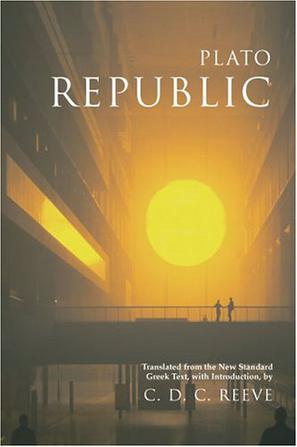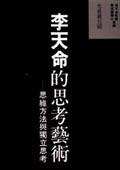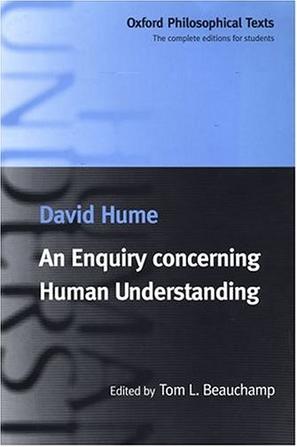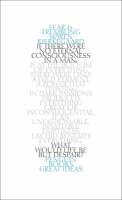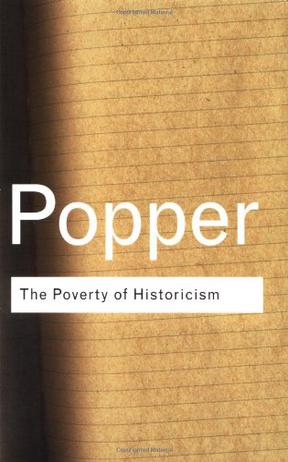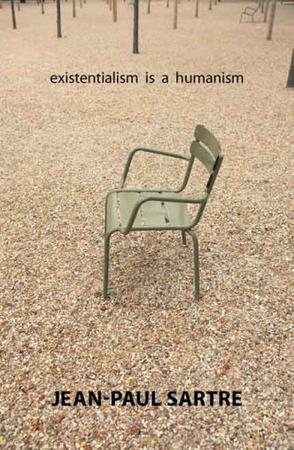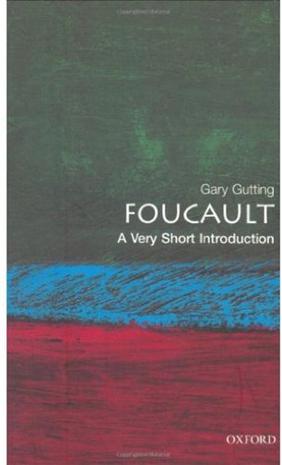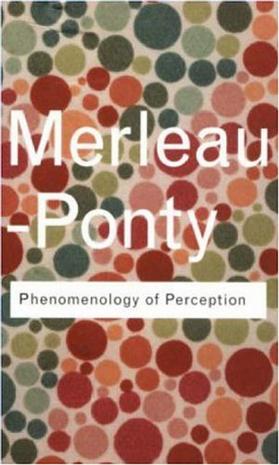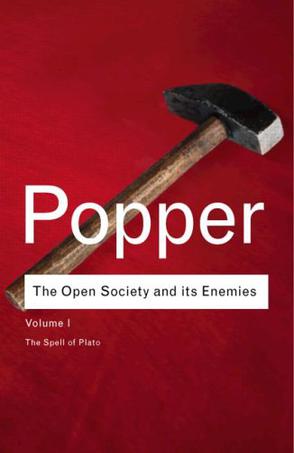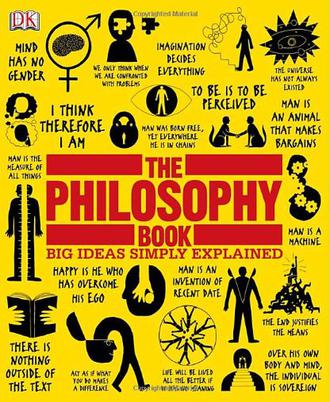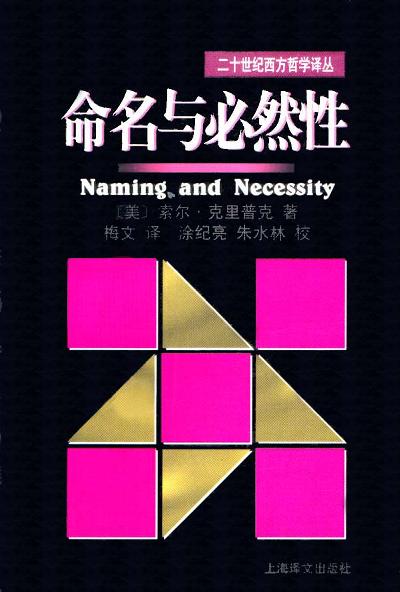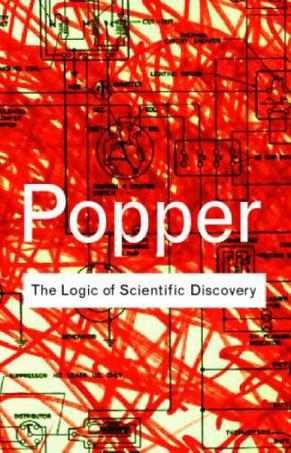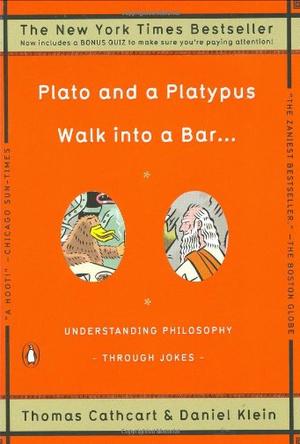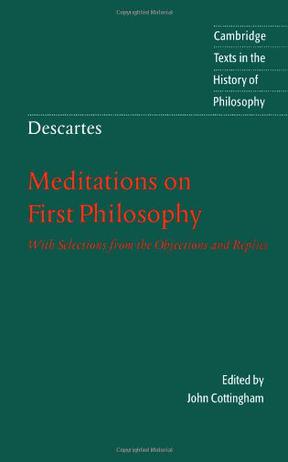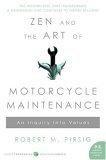欢迎来到相识电子书!
标签:philosophy
-
Mortal Questions
Thomas Nagel's Mortal Questions explores some fundamental issues concerning the meaning, nature and value of human life. Questions about our attitudes to death, sexual behaviour, social inequality, war and political power are shown to lead to more obviously philosophical problems about personal identity, consciousness, freedom and value. This original and illuminating book aims at a form of understanding that is both theoretical and personal in its lively engagement with what are literally issues of life and death. -
李天命的思考藝術
內容簡介 教育家的理想在於啟發人的思考,野心家的夢想是要取代人的思考。愚人只知接受思想的灌輸,智者則重視掌握思維的方式。胡亂思索問題,彷彿用蛛網去捕捉風的顏貌一樣,終是毫無所得的。正確的思維方法,就像荒夜裡的一盞風燈。提著自己的風燈,照亮未知的旅途,這就叫獨立思考。 作者簡介 戎子由牧師 香港路德會總幹事,香港路德會社會服務委員會主席,Concordia International School (協同國際學校) 校監兼校長,路德會呂明才中學校監。曾任教於協同神學,所發表著作包括對M. Buber的哲學研究,一向主張宗教在現代社會應持「開放型的思想取向」。 梁沛霖博士 香港中文大學理學士,美國密芝根大學 (Ann Arbor)哲學博士,曾任教於澳洲麥葛梨大學 (MacQuarie University) ,現任香港中文大學統計學系講師。除了專研統計學理論外,其研究興趣亦包括探討數學哲學與科學哲學,特別是有關悖論、概率論及歸納邏輯等方面的問題。 -
Philosophy
How ought we to live? What really exists? How do we know? This book introduces important themes in ethics, knowledge, and the self, via readings from Plato, Hume, Descartes, Hegel, Darwin, and Buddhist writers. It emphasizes throughout the point of doing philosophy, explains how different areas of philosophy are related, and explores the contexts in which philosophy was and is done. -
An Enquiry concerning Human Understanding (Oxford Philosophical Texts)
Oxford Philosophical Texts Series Editor: John Cottingham The Oxford Philosophical Texts series consists of authoritative teaching editions of canonical texts in the history of philosophy from the ancient world down to modern times. Each volume provides a clear, well laid out text together with a comprehensive introduction by a leading specialist, giving the student detailed critical guidance on the intellectual context of the work and the structure and philosophical importance of the main arguments. Endnotes are supplied which provide further commentary on the arguments and explain unfamiliar references and terminology, and a full bibliography and index are also included. The series aims to build up a definitive corpus of key texts in the Western philosophical tradition, which will form a reliable and enduring resource for students and teachers alike. David Hume's aim in writing An Enquiry concerning Human Understanding (1748) was to introduce his philosophy to a European culture in which many educated people read original works of philosophy. He gives an elegant and accessible presentation of strikingly original and challenging views about the limited powers of human understanding, the attractions of scepticism, the compatibility of free will and determinism, and weaknesses in the foundations of religion. Hume's philosophy was highly controversial in the eighteenth century and remains so today. The text printed in this edition is that of the Clarendon critical edition of Hume's works. A substantial introduction by the editor explains the intellectual background to the work and surveys its main themes. The volume also includes detailed explanatory notes on the text, a glossary of terms, a full list of references, and a section of supplementary readings. -
Fear and Trembling
Throughout history, some books have changed the world. They have transformed the way we see ourselves - and each other. They have inspired debate, dissent, war and revolution. They have enlightened, outraged, provoked and comforted. They have enriched lives - and destroyed them. Now Penguin brings you the works of the great thinkers, pioneers, radicals and visionaries whose ideas shook civilization and helped make us who we are. The Father of Existentialism, Kierkegaard transformed philosophy with his conviction that we must all create our own nature; in this great work of religious anxiety, he argues that a true understanding of God can only be attained by making a personal leap of faith'. -
The Poverty of Historicism
在线阅读本书 Hailed on publication in 1957 as 'probably the only book published this year that will outlive the century', this is a devastating criticism of the idea that there are fixed laws in history and that human beings are able to predict them. -
Existentialism Is a Humanism
It was to correct common misconceptions about his thought that Sartre accepted an invitation to speak on October 29, 1945, at the Club Maintenant in Paris. The unstated objective of his lecture ("Existentialism Is a Humanism") was to expound his philosophy as a form of "existentialism," a term much bandied about at the time. Sartre asserted that existentialism was essentially a doctrine for philosophers, though, ironically, he was about to make it accessible to a general audience. The published text of his lecture quickly became one of the bibles of existentialism and made Sartre an international celebrity.The idea of freedom occupies the center of Sartre's doctrine. Man, born into an empty, godless universe, is nothing to begin with. He creates his essence--his self, his being--through the choices he freely makes ("existence precedes essence"). Were it not for the contingency of his death, he would never end. Choosing to be this or that is to affirm the value of what we choose. In choosing, therefore, we commit not only ourselves but all of mankind.This edition of "Existentialism Is a Humanism" is a translation of the 1996 French edition, which includes Arlette Elkaim-Sartre's introduction and a QandA with Sartre about his lecture. Paired with "Existentialism Is a Humanism" is another seminal Sartre text, his commentary on Camus's "The Stranger." In her foreword, intended for an American audience, acclaimed Sartre biographer Annie Cohen-Solal offers an assessment of both works. -
Foucault
Foucault is one of those rare philosophers who has become a cult figure. Born in 1926 in France, over the course of his life he dabbled in drugs, politics, and the Paris SM scene, all whilst striving to understand the deep concepts of identity, knowledge, and power. From aesthetics to the penal system; from madness and civilisation to avant-garde literature, Foucault was happy to reject old models of thinking and replace them with versions that are still widely debated today. A major influence on Queer Theory and gender studies (he was openly gay and died of an AIDS-related illness in 1984), he also wrote on architecture, history, law, medicine, literature, politics and of course philosophy, and even managed a best-seller in France on a book dedicated to the history of systems of thought. Because of the complexity of his arguments, people trying to come to terms with his work have desperately sought introductory material that makes his theories clear and accessible for the beginner. Ideally suited for the Very Short Introductions series, Gary Gutting presents a comprehensive but non-systematic treatment of some highlights of Foucault's life and thought. Beginning with a brief biography to set the social and political stage, he then tackles Foucault's thoughts on literature, in particular the avant-garde scene; his philosophical and historical work; his treatment of knowledge and power in modern society; and his thoughts on sexuality. -
The World As Will and Representation (Volume 1)
Volume 1 of the definitive English translation of one of the most important philosophical works of the 19th century, the basic statement in one important stream of post-Kantian thought. Corrects nearly 1,000 errors and omissions in the older Haldane-Kemp translation. For first time translates and locates all quotes, provides full index. -
The Open Society and its Enemies, Volume I
Written in political exile in New Zealand during the Second World War and first published in two volumes in 1945, Karl Popper's The Open Society and Its Enemies is one of the most famous books of the twentieth century. Hailed by Bertrand Russell as a 'vigorous and profound defence of democracy', its now legendary attack on the philosophies of Plato, Hegel and Marx prophesied the collapse of communism in Eastern Europe and exposed the fatal flaws of socially engineered political systems. Popper's highly accessible style, his erudite and lucid explanations of the political thought of great philosophers and the recent resurgence of totalitarian regimes around the world are just three the reasons for the book's enduring popularity and why it demands to be read today. -
The Book of Dead Philosophers
This provides brief accounts of the way the great philosophers of the Western tradition died. It in the course of this provides very incidental and also brief accounts of aspects of their respective philosophies. It does not claim to be a comprehensive scholarly work. In fact Critchley makes the point that the purely academic philosophers especially of the positivist tradition tend to lead less interesting lives than those for whom Philosophy is not a mere academic study but rather a crucial element in living. So Critchley's concluding pages contain a large number of Continental primarily French philosophers. They also include a section on Chinese philosophers with a commentary on the Zen way of thinking about Death. Critchley too is guided by his own 'philosophy of life and death'. This is one in which there is a strong objection to ideas of an afterlife or world- to - come. He prefers a kind of straightforward courageous looking of Death straight in the eyes, and accepting it. The 'learning how to die wisely' that he commends involves a preparation in acceptance and understanding. The idea seems to to be, to be here when we are here, without worrying where we will one day not be. What surprised me in one sense is that while most of the accounts are interesting few are moving. It is perhaps possible to be moved by Sartre's final words to his Beaver, de Beauvoir assuring her of his Love ( provided that is that they are not her invention). It is possible to be amused by Thoreau's reply to the question, "Have you made your peace with God?" in which he says , "I did not know we had quarrelled " It is possible to be struck by the philosopher of the Absurd Camus' dying in an absurd car- accident. There are dozens of accounts which have some kind of fascinating twist or detail. And often what is best in them is what they reveal about the character of the philosopher involved. Often as for instance with the no- nonsense courageous Hume and the endlessly fussing and deceptive narcissistic Rousseau their deaths are the continuation of their characters in life. The book fascinates but in focusing on the deaths of the philosophers and not on their overall conception and experience of Death it misses much. Thus for me the most profound and insightful words of the book come quite close to the beginning . They paradoxically have little to do what the book is about. Critchley writes about "the aspect of death is hardest to endure: not our own death, but the deaths of those we love.It is the deaths of those we are bound to in love that undo us, that unstitch our carefully tailored suit of the self, that unmake whatever meaning we have made.In my view...it is only in grief that we become most truly ourselves.That is , what it means to be a self does not consist in some delusory self- knowledge, but in the acknowledgment of that part of ourselves that we have irretievably lost". I would suggest another book could be written about what the deaths of those close have meant to the great Philosophers. And in fact in the pioneering work of Ben- Ami Scharfstein on how the lives of philosophers have effected them we learn that many of the greatest philosophers lost a parent at an early age. Still another book of great interest could be written on what the Deaths of the Philosophers themselves have meant to those closest to them. This is by the way not a book for students of Philosophy only- but rather one for all those who somehow wish to know and think more about the inevitable- and prepare themselves for it. And this though I doubt it will deprive each and every one of us of his own experience his own most likely very unpleasant surprise. I will only add one personal note. The traditional Jewish way, for philosophers and not philosophers, of leaving this world- if that is one has a chance to do it peacefully - is through uttering the great affirmation of the Jewish faith - 'Shema Yisrael'. Surrounded by loved ones after having bid farewell to each and all in the most considerate way possible- I can imagine myself saying the 'Shema' as word of prayer and faith not only for myself but for all those I love and care about who continue here. A word of prayer and blessing as a way of ending this life may be the best a person can do. -
The Philosophy Book
To the complete novice, learning about philosophy can be a cause for dread. The Philosophy Book uses innovative graphics and creative typography to help demystify hard-to-grasp concepts for those new to philosophy, cutting through the haze of misunderstanding, untangling knotty theories, and shedding light on abstract concepts. Aimed at anyone with a general interest in how our social, political, and ethical ideas are formed, as well as students of philosophy and politics, The Philosophy Book breathes new life to a subject that is often regarded as esoteric and academic. -
命名与必然性
命名与必然性是美国当代著名逻辑学家和哲学家,模态逻辑语义学创始人之一的克里普克所著。本书是其代表作。书中所提出的两个新理论曾引起西方分析哲学界持续10多年的大决战。 -
The Logic of Scientific Discovery
When first published in 1959, this book revolutionized contemporary thinking about science and knowledge. It remains the one of the most widely read books about science to come out of the twentieth century. -
Plato and a Platypus Walk into a Bar . . .
This New York Times bestseller is the hilarious philosophy course everyone wishes they'd had in school Outrageously funny, Plato and a Platypus Walk into a Bar . . . has been a breakout bestseller ever since authors(and born vaudevillians)Thomas Cathcart and Daniel Klein did their schtick on NPR's Weekend Edition . Lively, original, and powerfully informative, Plato and a Platypus Walk Into a Bar . . . is a not-so-reverent crash course through the great philosophical thinkers and traditions, from Existentialism ( What do Hegel and Bette Midler have in common? ) to Logic ( Sherlock Holmes never deduced anything ). Philosophy 101 for those who like to take the heavy stuff lightly, this is a joy to read and finally, it all makes sense! -
Meditations on First Philosophy
This authoritative translation by John Cottingham of the Meditations is taken from the much acclaimed three-volume Cambridge edition of the Philosophical Writings of Descartes. It is based on the best available texts and presents Descartes' central metaphysical writings in clear, readable modern English. -
Zen and the Art of Motorcycle Maintenance
The extraordinary story of a man's quest for truth. It will change the way you think and feel about your life. "The cycle you're working on is a cycle called 'yourself.'" "The study of the art of motorcycle maintainence is really a study of the art of rationality itself. Working on a motorcycle, working well, caring, is to become part of a process, to achieve an inner peace of mind. The motorcycle is primarily a mental phenomenon." -- Robert M. Pirsig -
Philosophy of Science
What is science? Is there a real difference between science and myth? Is science objective? Can science explain everything? This Very Short Introduction provides a concise overview of the main themes of contemporary philosophy of science. Beginning with a short history of science to set the scene, Samir Okasha goes on to investigate the nature of scientific reasoning, scientific explanation, revolutions in science, and theories such as realism and anti-realism. He also looks at philosophical issues in particular sciences, including the problem of classification in biology, and the nature of space and time in physics. The final chapter touches on the conflicts between science and religion, and explores whether science is ultimately a good thing.
热门标签
下载排行榜
- 1 梦的解析:最佳译本
- 2 李鸿章全传
- 3 淡定的智慧
- 4 心理操控术
- 5 哈佛口才课
- 6 俗世奇人
- 7 日瓦戈医生
- 8 笑死你的逻辑学
- 9 历史老师没教过的历史
- 10 1分钟和陌生人成为朋友


